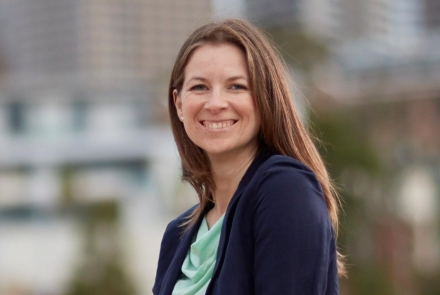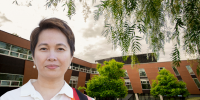
Books, bots, and blueberry cobbler: Meet Jennifer Hunt
Crawford School introduces our fantastic staff, so you can meet the people of Asia and the Pacific’s leading graduate policy school.
This time around, we talk to National Security College lecturer Dr Jennifer Hunt about the impact of misinformation on democratic debate, and how books have helped her balance her time spent online.
Can you tell us a bit more about how your research matters today?
I study cyber-enabled information operations in the national security space. These campaigns seek to poison the information global commons by laundering alternative facts and conspiracy theories. My research projects explore the velocity, reach and impact of disinformation across complex social networks and crucially, into offline terrains. Across the OECD we’ve seen examples of malicious actors foment division and doubt around key threats from climate change to pandemics. By using micro-targeting technology originally developed for advertising, they can tailor their message to specific audiences and disrupt transparent democratic debate. The consequences are not hypothetical. As we can see vividly from the US, misinformation spread from Facebook groups to Fox News to elected officials means the difference between life and death.
If you could go back and choose a different career path, what would it be?
My fencing coach in university made that career look like a life well spent. I was a walk-on to the sabre fencing team at university and was an assistant coach for a year after I graduated. Coach Miller coached and travelled with the UNC team for more than 50 years, training novices to Olympians, and even at 70 years old could still tear an overconfident 20-year-old to bits with the blade.
What do you believe is the biggest challenge to effective policy-making nowadays?
The post truth age fosters the erosion of public trust in science and expertise, hampering policy responses from climate change to pandemics, all while driving the defunding of research, universities and public broadcasting. We saw this earlier in the year when extreme bushfires were blamed on political enemies rather than on the predictable and inevitable consequences of climate change.
Can you tell us about a feel-good dish that you or someone in your family makes in stressful times?
Blueberry cobbler, my grandmother’s recipe. It’s basically equal parts sugar, flour, milk, butter and berries. While I usually save it for a Thanksgiving dish, I’ve made it as comfort food every weekend since April.
Can you give us your top three tips about how to stay positive during the COVID-19 outbreak?
During the COVID-19 pandemic, I have relied on good books, good company and a subpar treadmill. Currently reading Human Kind by Rutger Bregman to balance the time I spent on Twitter. I also highly recommend having a dog in your life, mine is an active pup who doesn’t let me languish on the couch or at the desk, but insists I get up and out of the house regularly to enjoy the great outdoors with her.
Updated: 22 November 2024/Responsible Officer: Crawford Engagement/Page Contact: CAP Web Team












